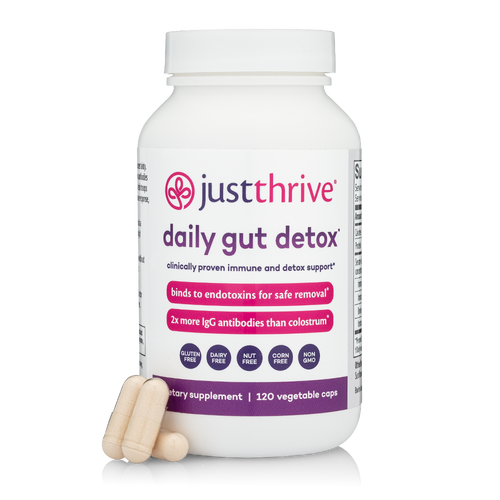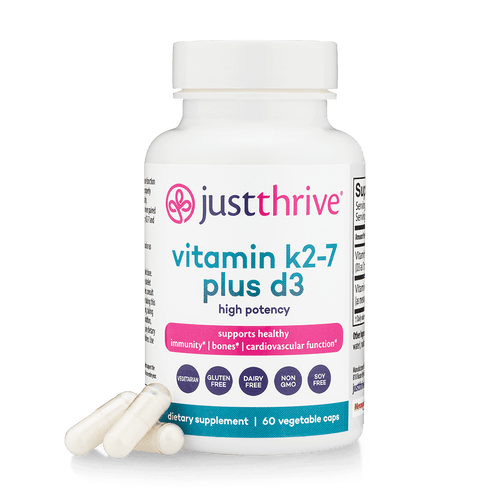We hear a lot of talk about antioxidants: They’re powerful… they stop free radicals… they protect you...
That’s all true, but it’s certainly not the full picture.
The real deal? Antioxidants can keep you younger, stronger, and healthier for longer.
But in order for them to do that very important job, your body needs enough of them in a form it can easily use.
And when your body is able to put antioxidants to work, you’ll notice a difference in your overall health – both inside and out!
Antioxidants’ Nemesis…
How bad are free radicals for your body?
That’s a trick question – because free radicals aren’t all bad (surprising, right?!).
Free radicals – highly unstable and reactive molecules – are natural by-products of many important bodily functions, like converting food into energy or exercising.
Your body creates, uses, and needs free radicals to keep you healthy. Your immune system uses them to fight infectious bacteria and viruses. In some cases, free radicals act as cell messengers that pass along crucial signals.
To manage free radicals, your body also creates the antioxidants – mainly glutathione, the master antioxidant – necessary to keep them under control.
Your body has a solid plan in place, but…
The plan doesn’t take an overwhelming amount of environmental and dietary free radicals into account. And that’s where problems set in.
Free radicals can also come from:
- UV light exposure
- Cigarette smoke
- Pollution
- Sugary, starchy foods
- Certain medications
- Pesticides
- Environmental toxins
- Infectious pathogens (including bacteria and viruses)
You can see that excess free radicals are difficult to avoid. And a free radical overload can lead to significant cellular damage… and long-term, serious health problems.

When Free Radicals Attack
If your body gets overwhelmed by free radicals and your internal antioxidant supply can’t keep up, oxidative stress starts to attack and damage your cells – even your DNA.
Oxidative stress can lead to a lot of health issues including:
- Premature aging
- Hypertension (chronic high blood pressure)
- Age related macular degeneration (a leading cause of blindness)
- Cancer
- Increased vulnerability to infections
To keep free radicals and oxidative stress from damaging your health, you need to level the playing field. And that means getting enough of bioavailable, protective antioxidants.
Antioxidants for Better Health and Longer Life
Nature’s response to free radicals is antioxidants, special compounds that neutralize rogue free radicals before they can do any damage to your cells.
By minimizing free radical activity, antioxidants protect you against oxidative stress and inflammation, two major causes of disease and premature aging.
When your body’s own glutathione army can’t keep up with free radicals, you need to quickly increase antioxidant supplies.
There are three main ways you can provide those crucial compounds:
- Antioxidant-rich fruits and vegetables
- Antioxidant supplements
- Antioxidant-producing beneficial bacteria in the gut
Unfortunately, getting enough antioxidants from foods and supplements isn’t as straightforward as it sounds. Sometimes your body simply can’t fully absorb and use those antioxidants.
And not all antioxidant supplements contain effective levels of these protective compounds.
That’s why your best antioxidant source often comes from the probiotic bacteria in your gut…

Your Body Craves These Antioxidants
The deep orange in carrots… the bright red in tomatoes… the golden sunrise in mangoes…
Those colors come from carotenoids, special pigments that work side gigs as powerful antioxidants. These rank among the body’s favorites when it comes to antioxidants, because they provide a wide variety of additional health benefits.
Carotenoids are especially well known for reducing the risk of cancer and improving cardiovascular health. These nourishing antioxidants help balance blood pressure, decrease inflammatory compounds, and improve blood sugar management.
Those are just some of the reasons why carotenoids are so plentiful in nature.
Five of the most protective natural carotenoid antioxidants include:
- Beta-carotene
- Lycopene
- Zeaxanthin
- Lutein
- Astaxanthin
All five offer unique combinations of health benefits, including strong support for your immune system.
But there’s a catch:
While many plant foods contain healthy supplies of carotenoids, your body can’t always fully absorb them.
However, you can increase absorption somewhat by making sure to eat some healthy fats along with carotenoid-rich foods.
That’s important, because in order for these antioxidants to protect you, your body has to be able to use them. And when it has a fresh, usable supply, your body makes the most out of every carotenoid.
How Carotenoids Keep You Healthier
Carotenoids help protect against chronic and infectious diseases, partly by enhancing immune system function. These antioxidants have been shown to significantly decrease the risk of hypertension (chronic high blood pressure).
Carotenoids help prevent cancer and improve cancer therapy outcomes. And, they also offer significant protection for lung function, especially in people living with chronic airflow issues like asthma and COPD.
And while this group of antioxidants provides broad health protection, each carotenoid offers its own unique health benefits.
Beta-carotene
This bright orange pigment brings an extra level of protection to the pulmonary system – the lungs. Studies show that higher beta-carotene intake is linked to better lung function in older women. It also helps protect against dementia.
On top of that, some beta-carotene also converts into vitamin A, a key component of immune health.
Vitamin A plays a crucial role in immune system regulation, inflammation management, and antibody (specialized cells that neutralize specific germs) production.
Lycopene
Well known for its role in prostate protection, tomato-red lycopene neutralizes free radicals to benefit your health in several important ways. It’s most important function, though, is protecting your cells and DNA from damage by free radicals.
Recent research shows that lycopene also:
- Helps sustain cognitive function and prevent dementia
- Protects against chronic inflammation and inflammatory diseases
- Helps protect against lung cancer
Lutein and Zeaxanthin
Lutein and zeaxanthin are best known for their role in vision protection, especially age related macular degeneration (ARMD) – a leading cause of blindness.
This team of marigold-yellow carotenoids shields your eyes against constant exposure to the damaging blue light produced by our phones, tablets, and TVs. Together, lutein and zeaxanthin create a natural barrier called MPOD (macular pigment optical density) that helps protect your retinas from oxidative stress.
The pair has also been found to preserve working memory in older adults.
Lutein on its own has also been shown to have anti-inflammatory effects, offering protection against many chronic diseases. It also helps drive healthy immune system response.
Zeaxanthin has been found to protect against NAFLD (non-alcoholic fatty liver disease) and other liver conditions, reduce artery stiffness (atherosclerosis), balance inflammation, and help prevent sunburn.
Astaxanthin
Astaxanthin doesn’t get as much attention as its carotenoid cousins, and that’s a shame. This powerful pinkish-red antioxidant provides a wealth of health benefits:
- Increased production of important immune cells
- Enhanced immune response
- Balanced inflammation
- Reduced oxidative stress
- Brain cell protection
- Providing a shield against sun damage
The key to cashing in on carotenoid health benefits? Bioavailability and absorption. And the best way to support both may surprise you...

Your Best Source for Antioxidants
Your body can’t make carotenoid antioxidants on its own, so it needs a fresh supply every day.
Some of that may come from your diet… but those carotenoids can be hard for your body to fully absorb and use. It takes heat to unlock carotenoids from the foods you eat. Plus, they need some fat to escort them through your digestive system.
Without both of those factors, your body may not be able to use the carotenoids you take in – even if you’re eating a super healthy diet.
That’s why the beneficial bacteria in your gut microbiome could be your body’s most important carotenoid antioxidant suppliers.
Probiotics Produce Antioxidants
Your gut microbiome (the trillions of bacteria that live in your gut) plays a bigger role in your overall health than most people realize.
One often overlooked function: antioxidant production.
Some beneficial bacteria produce potent, immediately absorbable carotenoids right inside your body’s main delivery system – your gastrointestinal (GI) tract.
When carotenoids start out inside your GI tract, they work extra effectively to fight the free radicals created during digestion – and that means extra protection for your gut. Plus, studies show that those carotenoids are more stable and usable than the ones you’d get through food.
One spore probiotic in particular – HU36™, a strain of Bacillus indicus – can create 15 different highly absorbable antioxidants, including the favorite five carotenoids:
- Beta-carotene
- Lycopene
- Zeaxanthin
- Lutein
- Astaxanthin
Those carotenoids may get produced in your GI tract, but they offer full-body protection, promoting better overall health and immunity.
Get the Antioxidant Advantage with Just Thrive
You need antioxidant protection… and you need those antioxidants to be bioavailable and usable.
That’s why you need the most stable, absorbable carotenoid antioxidants – the ones created right in your gut.
Just Thrive Probiotic delivers just that. It contains four clinically studied spore probiotics, and is the only retail available probiotic to feature HU36™ – the “antioxidant factory.”
Raise your antioxidant shield today with Just Thrive.
>> Try Just Thrive Probiotic today and save 22% with a subscription














